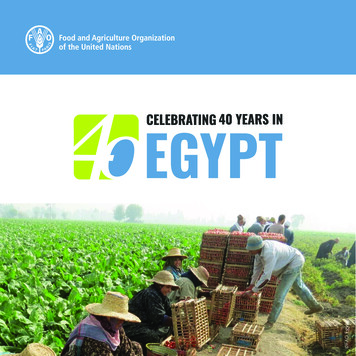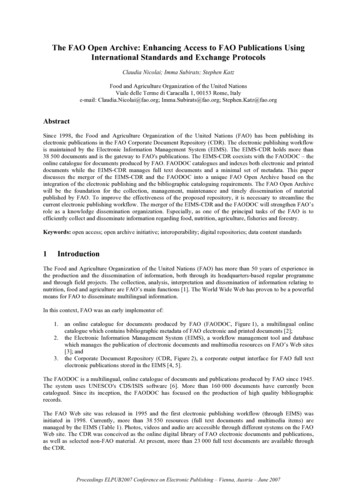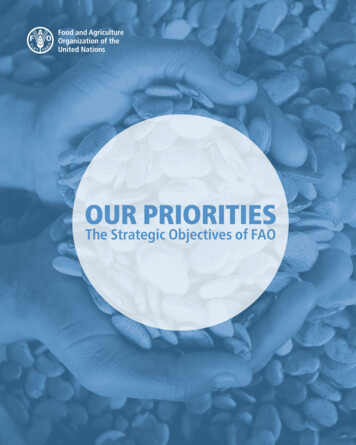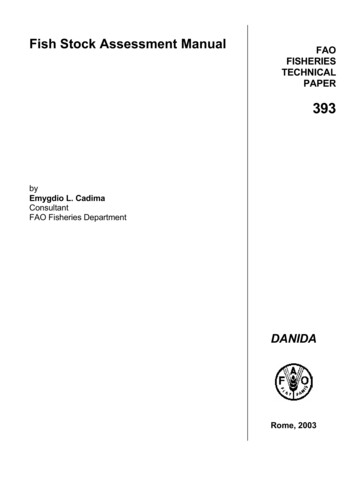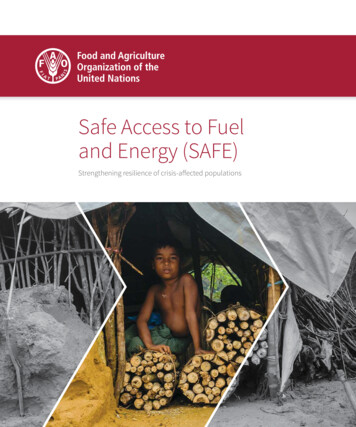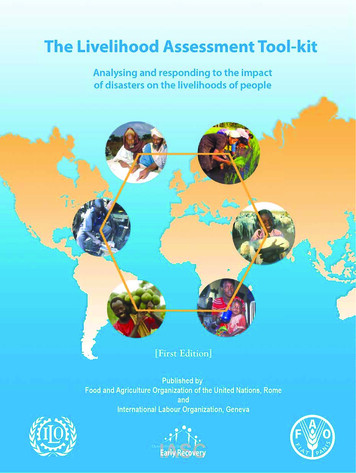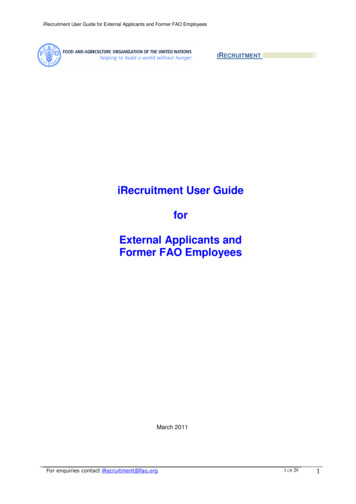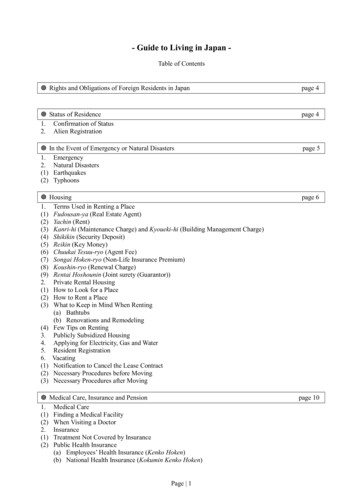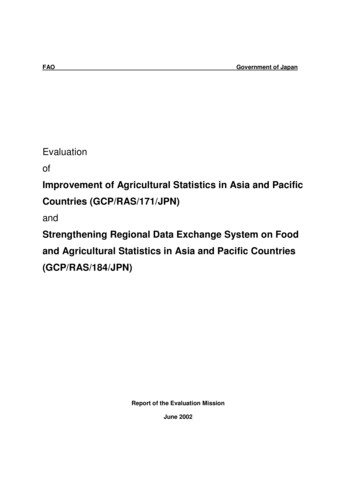
Transcription
FAOGovernment of JapanEvaluationofImprovement of Agricultural Statistics in Asia and PacificCountries (GCP/RAS/171/JPN)andStrengthening Regional Data Exchange System on Foodand Agricultural Statistics in Asia and Pacific Countries(GCP/RAS/184/JPN)Report of the Evaluation MissionJune 2002
GCPRAS171JPN 2002 ER.doc; 08 March 2011; 11:24PrefaceThe following document represents the views of the independent evaluation mission on the performance andachievements of the project Improvement of Agricultural Statistics in Asia and Pacific Countries(GCP/RAS/171/JPN), and to a lesser extent also its successor project Strengthening Regional DataExchange System on Food and Agricultural Statistics in Asia and Pacific Countries (GCP/RAS/184/JPN).The former project began its operations in 1998; its planned duration was extended to April 2002 to allow anoverlap with the follow-up project, which became operational in December 2001. The present evaluation focusesmainly on the first phase of the project, as results for the follow-up phase will still take time to become visible.The evaluation was initiated with a view to providing the donor, collaborating agencies and FAO with anindependent and objective assessment of the implementation results of the project, including proposals forany necessary changes in the project design and implementation approach of the follow-up project. Themission started on 23 April 2002 and ended on 20 May 2002; four countries involved in the project (Thailand,Cambodia, Bangladesh, and China) were visited to hold discussions with collaborators in ministries ofagriculture, statistical bureaux and other institutions. In addition, the mission met with FAO officials in thecountries concerned as well as in the Regional Office, and held talks with a range of international expertsand officials, among others from JICA and the Japanese embassy in Bangkok. The report also reflects the1responses to questionnaires sent out to project focal points prior to the mission .The mission's main views regarding the projects are presented in the summary, followed by more specificconclusions and recommendations. The main body of the report presents additional views andamplifications, while the annexes provide information on the mission background as well as briefs onstatistical systems and activities in the project's participating countries.Evaluating the project was a rewarding and challenging assignment given the wide scope of the project andits potential role as a precursor of major statistical activities being planned or already being initiated in theAsia and Pacific region.The evaluation mission is most appreciative of the efforts made by the project CTA, the project focal points inthe countries visited, and FAO officials in the Regional Office and country offices, as well as a range of otherindividuals who provided information and discussed issues in a frank and constructive manner. Last, but notleast, the officials of the focal point institutions in the respective countries gave excellent support to themission and provided valuable insights.The Evaluation MissionBernd Bultemeier, Evaluation Service, FAO, RomeYoichiro Kawasaki, Statistics Consultant (representing Japan)1iAt the time of writing this draft report, not all questionnaire responses had been received.
GCPRAS171JPN 2002 ER.doc; 08 March 2011; 11:24List of AcronymsAFSISAITAMAFAPCASArtfishASEANASEAN RAPSIAPSPFSWAICENTiiASEAN Food Security Information SystemAsian Institute of TechnologyASEAN Ministers of Agriculture and ForestryAsia and Pacific Commission on Agricultural StatisticsPackage of statistical approaches, technical documents and computer software (FAO)Association of South-East Asian NationsASEAN China, Japan and Republic of KoreaChief Technical AdviserFood and Agriculture Organization of the United NationsFAO’s major statistical databaseFishery Information, Data and Statistics Unit (FAO)Food Insecurity and Vulnerability Information and Mapping SystemHeadquartersInternational Development Centre of JapanInformation TechnologyJapan International Agricultural CouncilJapan International Cooperation AgencyMinistry of Agriculture and Cooperatives (Thailand)Project documentFAO Regional Office for Asia and the PacificStatistical Institute in Asia and PacificSpecial Programme for Food Security (FAO)World Agricultural Information Centre
GCPRAS171JPN 2002 ER.doc; 08 March 2011; 11:24TABLE OF CONTENTSPREFACE. ILIST OF ACRONYMS . IITABLE OF CONTENTS . IIIEXECUTIVE SUMMARY. VCONCLUSIONS AND RECOMMENDATIONS. VIIPROJECT DOCUMENT . VIIPROJECT REVIEW AND GUIDANCE ARRANGEMENTS. VIITECHNICAL AND OPERATIONAL BACKSTOPPING . VIIPROJECT MANAGEMENT . VIINATIONAL STATISTICAL DEVELOPMENT STRATEGIES AND PLANS . VIIPLAN FOR THE ESTABLISHMENT OF A DATA BASE AND EQUIPMENT FACILITIES TO PROVIDE A CAPABILITY TOTRANSFER DATA IN ELECTRONIC FORMAT . VIIIINVOLVEMENT BY NATIONAL STATISTICAL UNITS . VIIINATIONAL STATISTICAL DEVELOPMENT . VIIICOORDINATION WITH OTHER REGIONAL AND BILATERAL STATISTICAL ACTIVITIES . IXREGULAR COORDINATION AND HARMONIZATION WITH FAO STATISTICAL ACTIVITIES . IXEVALUATION OF PROJECT ACHIEVEMENTS AND OUTSTANDING ISSUES . IX1. INTRODUCTION AND BACKGROUND . 12. PROJECT OBJECTIVES AND DESIGN. 12.1ASSESSMENT OF PROJECT DESIGN . 23. INSTITUTIONAL ARRANGEMENTS . 24. PROJECT IMPLEMENTATION STATUS . 24.14.24.2.14.2.24.3PROJECT BUDGET AND EXPENDITURE . 3ACTIVITIES AND OUTPUTS . 3OUTPUTS UNDER IMMEDIATE OBJECTIVE ONE . 4OUTPUTS UNDER IMMEDIATE OBJECTIVE TWO . 5TECHNICAL AND OPERATIONAL BACKSTOPPING, PROJECT M ANAGEMENT . 85. ACTUAL AND POTENTIAL RESULTS . 8NATIONAL STATISTICAL DEVELOPMENT STRATEGIES AND PLANS DRAWN UP FOR THE IMPROVEMENT OF5.1FOOD AND AGRICULTURAL STATISTICS AND INFORMATION, FOR IMPLEMENTATION IN PARTICIPATING COUNTRIES . 8iii
GCPRAS171JPN 2002 ER.doc; 08 March 2011; 11:245.1.1IN-DEPTH STUDIES ON NATIONAL FOOD AND AGRICULTURAL STATISTICAL SYSTEMS . 85.1.2W ORKSHOPS ON SPECIFIC STATISTICAL AREAS . 105.1.3NATIONAL STATISTICIANS AND DATA USERS TRAINED THROUGH SEMINARS ON AGRICULTURALSTATISTICS .125.2PLAN FOR THE ESTABLISHMENT OF A DATA BASE AND FACILITIES TO TRANSFER DATA IN ELECTRONICFORMAT . 126. SPECIFIC TOPICS AND ISSUES . 136.16.2COST-EFFECTIVENESS . 13COORDINATION OF PROJECT ACTIVITIES WITH OTHER STATISTICAL ACTIVITIES . 13ANNEXES . 14TERMS OF REFERENCE FOR THE EVALUATION MISSION. 14ITINERARY AND PERSONS MET . 17LIST OF TECHNICAL COOPERATION PERSONNEL (PROJECT STAFF, CONSULTANTS) . 21LIST OF TRAINING SEMINARS, WORKSHOPS, CONSULTATIONS ORGANIZED BY THE PROJECT . 22REPORTS AND OTHER INFORMATION M ATERIALS PRODUCED BY THE PROJECT . 24COUNTRY BRIEFS . 26BANGLADESH . 26CAMBODIA . 28CHINA . 30THAILAND . 32BHUTAN. 34FIJI . 35INDIA . 36INDONESIA . 37IRAN . 38LAO PDR . 39MYANMAR. 41NEPAL . 43PAKISTAN . 45PHILIPPINES. 46SRI LANKA . 47VIET NAM . 48QUESTIONNAIRE . 50QUESTIONNAIRE ON PROJECT GCP/RAS/171/JPN. 51iv
GCPRAS171JPN 2002 ER.doc; 08 March 2011; 11:24EXECUTIVE SUMMARYAt the Sixteenth Session of the Asia and Pacific Commission on Agricultural Statistics (APCAS), held inTokyo, Japan in October 1996, the need for accurate and timely data on food and agriculture was stressed.It was recognized that while participating countries had made substantial improvements in their food andagricultural statistics systems, more changes needed to be introduced in many countries, such as theadoption of modern techniques for data collection, processing, analysis and dissemination, including theelectronic transfer of data. Furthermore, cooperation among Asia and Pacific countries for the exchange offood and agricultural statistics had remained comparatively weak.In order to address this situation, the Government of Japan responded to a request for assistance coming fromthe APCAS seminar and provided resources to launch the project "Improvement of Agricultural Statistics in Asiaand Pacific Countries" (GCP/RAS/171/JPN, final budget US 987,772), which began operations in May 1998.This project ended in April 2002, overlapping by a few months with its follow-up project "Strengthening RegionalData Exchange System on Food and Agricultural Statistics in Asia and Pacific Countries" (GCP/RAS/184/JPN,current budget US 679,731), which started in December 2001 and is planned to end in November 2004. Thepresent evaluation focuses mainly on the former project.The project pursued two immediate objectives: (i) National Statistical Development Strategies and Plansdrawn up for the improvement of food and agricultural statistics and information, for implementation inparticipating countries; and (ii) plan for the establishment of a data base and equipment facilities, in anumber of countries, to provide a capability to transfer data in electronic format both to and from countries inthe Region, and FAO, using common concepts, standards and classifications.Towards the attainment of these objectives, important results have been achieved, including: the organization of nine in-depth studies and eight national seminars on national food and agriculturalstatistical systems in participating countries, resulting in the identification of constraints and theformulation of recommendations for improvements;the implementation (some jointly with FAO HQ and other organizations) of six regional and sub-regionaltechnical workshops, leading to an improved knowledge by national statisticians of advanced statisticalmethods and approaches;preparations for the establishment of a regional data and information exchange system, including theholding of consultations with national focal points and the development of a follow-up project document(GCP/RAS/184/JPN) for the attainment of this objectiveFurthermore, the project now forms part of (and perhaps has triggered) a wider initiative towards theimprovement of agricultural and food security information systems: ASEAN and three East Asian countries (Peoples’ Republic of China, Japan and Republic of Korea)started discussions concerning food security related information in 2001, in parallel with plans regardingregional food (rice) reserves, and have agreed on an “ASEAN Food Security Information System”(AFSIS) project funded by Japan;Japan is contributing to a second phase of the Asia FIVIMS (Food Insecurity and VulnerabilityInformation and Mapping System) project and possibly a Food Demand/Supply Forecast Modellingproject to be implemented by FAO;projects under the FAO Special Programme for Food Security (SPFS) are paying increasing attention todata and information issues;JICA is planning to launch a project on Agricultural Statistics and Economic Analysis Development inThailandDespite these achievements, the mission noted certain shortcomings in the project, which have hampered itseffectiveness and could jeopardize the follow-up project. These shortcomings include the fact that the projectdesign was over-optimistic regarding achievement of Immediate Objective One (national statisticaldevelopment strategies and plans drawn up), as it lacked specific outputs, as well as resources and time, toattain this objective. Likewise, for Immediate Objective Two (plan for the establishment of a data base andequipment facilities) most planned project activities were geared towards general statistical issues, and thefinal shape of the proposed data and information exchange system still needs to be defined.Nevertheless, the regional data exchange concept of the project is appreciated by collaborators inparticipating countries as well as by development agencies. A comprehensive and consistent approach tov
GCPRAS171JPN 2002 ER.doc; 08 March 2011; 11:24statistical data collection, processing, analysis and dissemination in the region is seen as an importantprecondition for agricultural and food security policies, and the project is set to play an important part in thisendeavour.The mission views the first phase of the project as a pilot phase, which has tested approaches, tried outcollaboration arrangements, developed institutional links and refined concepts. The project still has to moveto a stage where physical results become more widely visible. The original project (GCP/RAS/171/JPN)lacked the resources to go beyond raising awareness for the limitations in countries' statistical systems andproviding initial technical training. While some countries have made great strides in transforming theirstatistical systems, others are – mainly for budgetary reasons - unable to undertake even small stepstowards the kind of systematic improvements of their statistics systems that are envisaged by the project.The follow-up project must therefore, apart from establishing the model for a regional exchange system, alsopay close attention to the institutional capacities of statistical authorities of the participating countries andfacilitate contacts with technical assistance donors wherever possible.Apart from the tasks mentioned above, major assignments during the follow-up phase (GCP/RAS/184/JPN)will be: a closer integration of national focal points, by designating focal point meetings to play the role of projectsteering committee (review and planning body, with FAO and donor participation), and also by havingmore frequent meetings (at least once yearly);still at the national level, a better recognition of the diversified institutional responsibilities for agriculturaland food security statistics in the participating countries, by formally nominating not only focal points butalso major collaborators in the respective countries as national project implementation groups;at the regional level, establishing and maintaining close contact with managers and designers of therelated regional and bilateral projects and initiatives with statistical components (AFSIS, Asia FIVIMS,etc), in order to develop consistent approaches and avoid overlapOther issues have to be tackled as well during the present phase; these are addressed in the conclusionsand recommendations section at the end of the summary. The main body of the report presents additionalviews and amplifications.The mission acknowledges that investment in statistical development figures low on government agendas,as most countries in the region face substantial constraints in terms of human resources as well as funding.Under the circumstances, the project has performed well by paving the way for improvements in national aswell as regional statistical systems. The momentum that the original project has built is kept by the follow-upproject and is likely to be complemented by a wider range of other bilateral and regional projects.It is the view of the mission that the possibility exists for the follow-up project to attain its full potential –assisting countries in the region in their efforts to produce and exchange up-to-date agricultural and foodsecurity data. However, the project alone cannot achieve this objective. Key success factors in the mission'sopinion include, in addition to the exchange mechanism provided by the project, improvements in thenational statistical systems of some participating countries in terms of budgetary resources, hardware,software, and human resources development, as well as increased attention given to the harmonization andimprovements of concepts, definitions and methods applied by the various national statistical units.vi
GCPRAS171JPN 2002 ER.doc; 08 March 2011; 11:24CONCLUSIONS AND RECOMMENDATIONSProject documentPlanned activities, outputs and objectives were not always logically consistent. Moreover, the project designwas over-optimistic regarding Immediate Objective One (national statistical development strategies andplans drawn up), and also expectations regarding Immediate Objective Two (plan for the establishment of adata base and equipment facilities) did not take fully into account the limited time and resources available.Project review and guidance arrangementsInstitutional review and guidance arrangements were only touched upon in the prodoc; national Focal Points(coming from the department in charge of agricultural statistics) were nominated, but their effective mandatewas not spelled out. Two meetings of focal points were held in June 1999 and October 2001 - too few to2provide much guidance to the project . A mid-term review mentioned in the prodoc did not take place.Recommendation: There should be a closer integration of national focal points, by designating focal pointmeetings to play the role of a project steering committee (review and planning body, with FAO and donorparticipation), and also by having more frequent meetings (at least once yearly - the prodoc of projectGCP/RAS/184/JPN stipulates one every two years). The project should also better recognize the diversifiedinstitutional responsibilities for agricultural and food security statistics in the participating countries, byformally nominating not only focal points but also other major collaborators in the respective countries asnational project implementation groups.Technical and operational backstoppingThe amount of technical backstopping has been limited due to the absence of a regular FAO RegionalStatistician in the Regional Office. However, for the most part a long-term technical consultant substituted forthat position, and several workshops organized jointly with FAO HQ enabled the project to keep in touch withFAO technical backstopping units. Operational backstopping seems to have been without problems.Project managementProject management had to operate a project whose design was ambitious in relation to the resourcesavailable. Under the circumstances, project management was successful in establishing an initial network offocal points, and assisting those countries covered by an in-depth review or national seminar in identifyingconstraints and opportunities in their statistical systems. It has thus laid the foundation for the follow-upproject on regional data and information exchange, as well as for other planned activities in the regionconcerning food and agriculture information.National Statistical Development Strategies and PlansThe project has organized nine in-depth studies and eight national seminars on national food and agriculturalstatistical systems in participating countries, which have resulted in the identification of constraints and theformulation of recommendations for improvements. In addition, six regional and sub-regional technicalworkshops have been implemented (some jointly with FAO HQ and other organizations), leading to animproved knowledge by national statisticians of advanced statistical methods and approaches.These activities have also resulted in increasing interest in, and willingness to, improve agricultural statisticsin member countries. They have, however, not resulted in the formulation of national statistical developmentstrategies and plans, in the sense of development plans duly approved and budgeted for by nationalauthorities. For this, the project design lacked specific outputs, as well as resources and time, to assistcountries where such a plan did not already exist.Statistical development has to be achieved through countries' own resources or international assistance.However, some countries' capacities appear limited, as economic problems have caused budget andmanpower reductions in statistical institutions in many countries, sometimes even disproportionately so whencompared to cuts in other government departments.2An APCAS meeting in 2000 provided an opportunity to meet with some focal points, but could not substitute for a dedicated meeting offocal points.vii
GCPRAS171JPN 2002 ER.doc; 08 March 2011; 11:24Plan for the establishment of a data base and equipment facilities to provide a capability to transferdata in electronic formatThe project has organized preparatory meetings consultations with national focal points for the establishmentof a regional data and information exchange system, and has prepared the project document for the followup project GCP/RAS/184/JPN, which is now moving towards the creation of a pilot regional data andinformation exchange system. However, the final shape of the proposed data and information exchangesystem, including agreement on common concepts, standards and classifications, still needs to be defined.Most member countries are strongly interested not only in the data exchange system but also computerprocessing of survey data. However, the large amount of investment necessary for computers preventsthese countries from introducing IT systems, especially in field offices. In some countries, even centralgovernment offices in charge of statistics have insufficient computer/communication facilities. Importantdifferences are also found among countries concerning the scope of their statistical databases and theirpresence on the Internet.Recommendation: Project GCP/RAS/184/JPN should learn from its predecessor project: it should not setover-ambitious targets for the exchange system development. It workplans should be formulated to fit theresources and time available. At the same time, priority should be placed on covering the data needsidentified by member countries themselves. Also, the project will have to develop a differential strategy forinvolving those countries that are advanced in terms of using modern computer/communication technologyas well as those that are less advanced.Involvement by national statistical unitsThe project's focal points, and with them their national statistical units, have been involved in the projectthrough focal point meetings, preparation of in-depth studies and national seminars as well as regional andsub-regional meetings. However, given the number of participating countries, the involvement by individualcountries has been uneven. This may have been influenced by their levels of statistical development as wellas their resources available for supporting innovations.Recommendation One: For the follow-up project, the decision as to which countries (5 to 6 countries areforeseen) should participate in the pilot phase of the regional data and information exchange system, shouldbe based on criteria related to their effective capacity to participate in project activities. Criteria for the focalpoint organization could be: being in charge of coordination and guidance regarding agricultural and food security statistics, andthus able to solicit and integrate inputs into the exchange system; having reached a certain degree of IT literacy, including the capability to design, maintain and updatea webpage; possessing the ability to translate datasets into EnglishSelection criteria as well as the actual decision concerning pilot countries should be on the agenda of thenext focal point meeting planned for July 2002.Recommendation Two: For countries currently not in a position to make a meaningful contribution (i.e. withno or only rudimentary email and Internet access and/or no or only few databases available in other thannational languages), efforts should be made to identify sources for additional technical assistance to updatethe countries' IT and translation capabilities.National statistical developmentA number of activities supported by the project have focused attention on issues and constraints in countries'statistical sy
Artfish Package of statistical approaches, technical documents and computer software (FAO) ASEAN Association of South-East Asian Nations ASEAN 3 ASEAN China, Japan and Republic of Korea CTA Chief Technical Adviser FAO Food and Agriculture Organization of the United Nations FAOSTAT FAO's major statistical database
